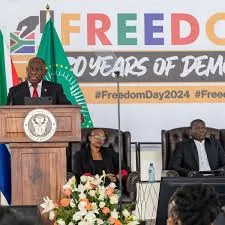South Africa marked 30 years since the end of apartheid and the birth of its democracy with a ceremony in the capital on Saturday, including a 21-gun salute and the unfurling of the country's multi-colored flag.
But any sense of celebration on this historic anniversary has been met with growing discontent with the current government.
President Cyril Ramaphosa presided over the event in a large white tent in the grounds of government buildings in Pretoria as head of state.
He also spoke as leader of the African National Congress (ANC) party, widely credited with liberating South Africa's black majority from the racist system of oppression that made the country a pariah for nearly a half-century.
The ANC has been in power since the first democratic elections of all racial groups on April 27, 1994, the vote that officially ended apartheid.
But Freedom Day came against a poignant backdrop: Analysts and polls predict that the waning popularity of the party once led by Nelson Mandela risks seeing it lose its parliamentary majority for the first time, as a new generation of South Africans are making their voices heard in what could be the most important elections since 1994 next month.
“ Few days in the life of our nation can be compared to this day, when freedom was born,” Ramaphosa said in a speech focused on nostalgia for 1994, when black people were first allowed to vote, the once-banned ANC swept to power, and Mandela became the country's first black president. “South Africa has changed forever. “It signaled a new chapter in our nation’s history, a moment that resonated across Africa and around the world .”
“On that day, the dignity of all the people of South Africa was restored ,” Ramaphosa added.
Ramaphosa, who stood in front of a banner reading "Freedom", also acknowledged South Africa's major problems three decades on, with significant poverty and inequality, issues that will once again be at the center concerns when millions of people vote on May 29 . Ramaphosa admitted there had been “setbacks”.
The 1994 elections transformed South Africa as blacks and other non-white people were denied most basic freedoms, not just the right to vote. Laws controlled where they lived, where they were allowed to go each day, and what jobs they could have.
After the end of apartheid, a Constitution was adopted guaranteeing the rights of all South Africans, regardless of race, religion, gender or sexual orientation.
But it has not significantly improved the lives of millions of people, with South Africa's black majority, who make up more than 80% of the population of 62 million, still heavily affected by severe poverty.
The official unemployment rate is 32% , the highest in the world, and more than 60% for young people aged 15 to 24. More than 16 million South Africans – or 25% of the country – rely on monthly benefits to survive.
South Africa remains the most unequal country in the world in terms of wealth distribution, according to the World Bank, with race a key factor.
While the legacy of apartheid remains difficult to erase, the ANC is increasingly blamed for South Africa's current problems.
Tags:
africa
africaaustralia
black majority
cyril ramaphosa
freedom ceremony
gun salute
historic anniversary
mixed record
multi colored flag
nelson mandela
pretoria
south africa
white majority




Good
ReplyDeleteGood
ReplyDeleteGood
ReplyDeleteGood
ReplyDelete13
ReplyDeleteGood
ReplyDeleteGood
ReplyDeleteGood
ReplyDeleteSouth Africa commemorates 30 years post-apartheid with President Ramaphosa acknowledging progress but also persistent challenges like poverty and inequality. The ANC faces scrutiny ahead of upcoming elections amid discontent with current governance.
ReplyDeleteGreat
ReplyDeleteInformative
ReplyDelete